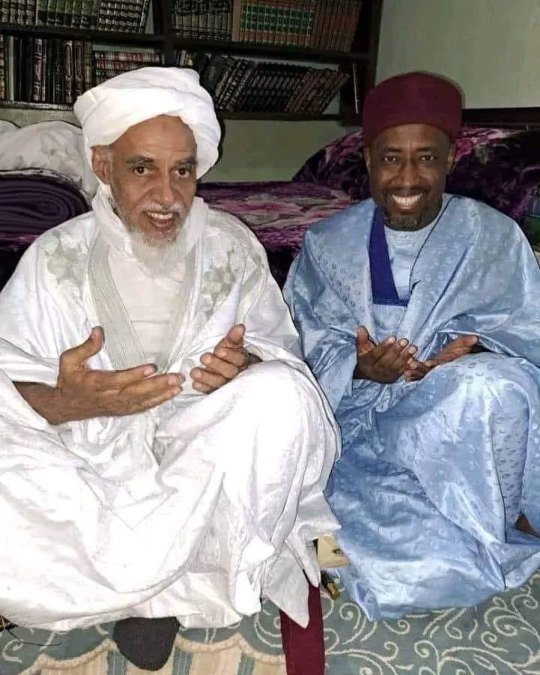#istiqama
Photo

#QuoteOfTheDay (20230110): “Tak seorang pun yang telah memberikan yang terbaik menyesalinya.” (George Halas) Sebagai pemain, pelatih, dan pemilik sepak bola profesional, George Halas (1895-1983) telah banyak menyaksikan orang-orang yang memberikan upaya terbaik mereka. Menang - kalah adalah biasa, asal kita telah mencurahkan segala kemampuan, sesuai peran yang diamanahkan. Menang (sukses) meninggalkan legacy/ kenangan manis. Kalah (gagal) tak sampai membuat terpuruk. Segera evaluasi untuk improvement diri. “Tugas kita adalah: Perbaiki diri, lakukan yang terbaik,” begitu pesan Aa Gym. Tak perlu menyesal telah berbuat baik. Ingatlah, “Apa yang tidak ditakdirkan untukmu tidak akan engkau dapatkan.” (Abu Dawud: 4077). “Mereka tetap istiqamah, tidak ada rasa khawatir pada mereka, dan mereka tidak (pula) bersedih hati. Mereka itulah para penghuni surga, kekal di dalamnya; sebagai balasan atas apa yang telah mereka kerjakan.” (Al-Ahqaf: 13-14) #Nobody #who #ever #gave #their #best #regretted #self #improvement #istiqama #reward #jannah Telegram Channel https://t.me/x_QoTD https://www.instagram.com/p/CnNVBU_SlEi/?igshid=NGJjMDIxMWI=
2 notes
·
View notes
Photo

#QuoteOfTheDay (20230309): “Bukan kemudahan yang mengantarmu pada kesuksesan, tetapi tangga keberhasilan itu disusun atas kegagalan dan perjuangan.” (Galih Fajar) Siapa yang tak ingin mendapatkan berbagai kemudahan untuk meraih keberhasilan? Namun Sunnatullahnya itu harus dilalui dengan berbagai ujian. Misalnya ujian keimanan mendadak harus berperang (Ali-Imran: 166). Atau sabda Rasulullah ﷺ, "Sesungguhnya seorang hamba, apabila memiliki kedudukan di mata Allah, tidak ia peroleh dengan amalannya, maka Allah mengujinya pada jasadnya, harta, atau pada anaknya." (HR. Abu Daud: 2686) Karena itu istiqamah saja dengan amalan terbaik. Sebab dibalik kata istiqamah ada perjuangan yang kuat, pengorbanan yang banyak, dan doa yang tidak pernah henti. Bila masih terjadi kegagalan, jadikan kegagalan itu tambahan anak tangga untuk perjuangan berikutnya. Semangat! #No #ease #leads #success #ladder #made #up #failures #Struggle #istiqama #righteous #deeds Telegram Channel https://t.me/x_QoTD #ananabilaolshop #resellerwelcome #jadiSLCyuk #wakafyuk #wakafQuran #wakafbukuyuk (di Ana nabila olshop) https://www.instagram.com/p/CpizMmRSKhg/?igshid=NGJjMDIxMWI=
#quoteoftheday#no#ease#leads#success#ladder#made#up#failures#struggle#istiqama#righteous#deeds#ananabilaolshop#resellerwelcome#jadislcyuk#wakafyuk#wakafquran#wakafbukuyuk
0 notes
Text
ISLAM 101: Spirituality in Islam: Part 230
Istiqama (Straightforwardness)
People of truth have interpreted straightforwardness as avoiding all deviation and extremes, and as following in the footsteps of the Prophets, the faithful, the witnesses (of truth), and the righteous (in belief) in their religious deeds and daily lives. The verse: Those who declare: “Our Lord is God,” and afterwards are straightforward, the angels descend upon them (saying): “Fear not nor grieve, and good tidings to you of Paradise which you were promised” (41:30) informs us that angels will receive in the Hereafter those who acknowledged God’s Lordship, affirmed His Unity, and followed the Prophets in their beliefs, deeds, and daily lives. Such a blameless life will cause these people to receive the good tidings of Paradise at a time when all people will tremble with fear and worry on the Day of Judgment.
An individual’s conduct becomes straightforward by performing religious duties; one’s ego (inner self) becomes straightforward by following the Shari’a’s truth; one’s spirit becomes straightforward by acting in accordance with knowing God; and one’s innermost senses or faculties becomes straightforward by complying with the Shari’a’s spirit. The difficulty of being straightforward in all of these levels caused the Prophet, the most straightforward of people, upon him be peace and blessings, to say: Sura Hud and others similar to it have made me old, [1] thereby referring to the Divine command: Be straightforward as you are commanded, which is in sura Hud (11:112).
The Prophet, upon him be peace and blessings, never deviated from the Straight Path, and was always straightforward in his deeds, words, and feelings. He guided Companions who sought salvation and eternal happiness to straightforwardness by saying: Declare: “I have believed in God,” and then be straightforward, a saying that concisely sums up all essential elements of belief and conduct.
If people claim progress on the path to the Truth but are not straightforward in their state and conduct, all efforts will be in vain, and they will have to account in the Hereafter for the time spent without straightforwardness. [2] To reach the intended destination, an initiate must be straightforward at the beginning, maintain it throughout the journey, and be straightforward at the end of the path, as gratitude for being rewarded with knowledge of God. Being alert to possible deviation at the beginning, engaging in self-supervision during the journey, being closed to wrong thoughts and actions, and considering only God’s pleasure and approval at the end are significant signs of this state:
I know one among the people of straightforwardness:
He was the most distinct in the realm of guidance.
He sold his soul to the lights of (Divine) Identity, [3]
And died purified of all the dirt of human nature.
A servant should seek straightforwardness, not wonderworking or the power of spiritual unveiling or discovery. God demands straightforwardness; however, a servant desires extraordinary spiritual abilities. When they told Bayazid al-Bistami about a man who walked on water and flew in the air, he said:
Fish and frogs also float on water, and insects and birds fly in the air. If you see a man float on his rug on water without sinking and sit cross-legged in the air, do not show any interest in him. Rather, consider whether he is straightforward in his state and conduct, and whether they are in accordance with the Sunna (the way of the Prophet, upon him be peace and blessings). [4]
What Bayazid advises is that a believer be straightforward and completely humble as a servant, not one flying in the atmosphere of wonders.
Straightforwardness is the last step on a three step stairway leading to nearness of God. The first step is consistency, where a traveler strives to embody Islam’s theoretical and practical dimensions. Success in this continuous effort brings one’s carnal self under control. The second step is settlement or tranquillity, where an initiate purifies his or her inner self of the vices contaminating the spirit and heart (e.g., show, fame, and vanity, all of which cannot be reconciled with servanthood), thereby purging the heart of all that is not God. The third step is straightforwardness, where the doors of Divinity and creation are slightly opened to the traveler, and the Divine gifts are bestowed in the form of wonderworking and blessings, although he or she neither desires nor seeks them.
Straightforwardness, the last station of the way, means living without deviation from loyalty to God and under His direct protection; it is an environment in which Divine gifts and favors are bestowed. Flowers never fade away and hills and slopes do not experience winter, for it is an environment of eternal “spring.” This is what is pointed out in: If only they were straightforward on the path, then, assuredly We would give them to drink of “water” in abundance (72:16). So long as people pursue straightforwardness on the path of belief in Divine Unity and fulfill their covenants with God and His Messenger by fulfilling the Divine ordinances, Divine gifts and bounties will flow abundantly.
Our master, upon him be peace and blessings, declares: So long as the heart of a servant is not sound and straight, his belief cannot be true and upright; so long as his tongue is not true, his heart cannot be sound and straight. [5] He also declares: Every morning, the parts of a man’s body warn his tongue, saying: “Fear God concerning us. For if you are true, we will be true and straight; if you are crooked, we will also deviate.” [6]
Finally, let us hear from As’ad Mukhlis Pasha a very significant warning:
Straightforwardness requires always being true and steadfast;
Fix one of your legs in the center, and let “the free arm of the compass” [your other leg] travel around. [7]
[1] Al-Tirmidhi, “Tafsir al-Qur’an,” 57.
[2] Muslim, “Iman,” 62; Ibn Hanbal, Musnad, 3:413.
[3] In other words, he submitted himself wholly and without reserve to God.
[4] Al-Qushayri, Al-Risala, 397; Ahmad ibn ‘Abd Allah Abu Nu’aym, Hilyat al-Awliya’ wa Tabaqat al-Asfiya’, 10 vols. (Beirut, 1967), 10:40.
[5] Ibn Hanbal, Musnad, 3:198.
[6] Al-Tirmidhi, “Zuhd,” 61; Ibn Hanbal, Musnad, 3:96.
[7] In other words, one is to be well-grounded in Islam and to keep the company of those who can provide proper guidance.
#allah#god#islam#muslim#quran#revert#convert#convert islam#reevrt islam#revert help#reevrt help team#help#islamhelp#converthelp#how to convert to islam#convert to islam#welcome to islam
2 notes
·
View notes
Photo

Sufi Master Younus AlGohar said on 02/12/23 In reality, Miracles are preformed by Saints when they are in a special state. Which is called Aalam-E-Jalaal. In this state, they are unable to control themselves. So it means this is a spiritual weakness. Now try to understand Aalam-E-Jalaal, if Nadeem or Amjad bhai become mad you might say they are in Aalam-E-Jalaal, this is not Aalam-E-Jalaal. Jalaal is something else, this is anger. Now what is Jalaal? Listen attentively. For example, the capacity of your heart is 1 gram of Noor (Divine Energy). Whenever it is increased to 1.1 grams, that is Aalam-E-Jalaal, then you will be out of control. What is your Aalam-E-Jalaal? 1.1. If Ikhlaq’s heart’s capacity is 2 grams(of noor) at optimum, then he will not be jumping out of control. And you are jumping around at 1.1. Now Let’s go to Ali, if his hearts capacity is 3 grams, the higher capacity someone has, the more he will say, “I don’t feel anything. I don’t even know if my heart is doing Zikr.” The more the capacity is increased, the less you will be able to feel your Zikr. If Ikhlaq’s goes to 2.2 suddenly then he will be out of control. This is Aalam-E-Jalaal. Do you understand? Now, if it becomes 1.1 and you are out of control, then what will the Spiritual Master do? The Spiritual Master will say Zahir Shah- He will not tell him! The Spiritual Master will say: Zahir Shah, fast for a couple days, and offer extra worship. After a week, he will ask him to worship more and to fast everyday. Now what happened a few months, Zahir Shah’s capacity increased. Now if someone casts their spiritual attention on him, now 1.1 will not affect him. This is called Istiqama. #ifollowGoharShahi #ImamMehdiGoharShahi #GoharShahi https://www.instagram.com/p/ComwDOAPELv/?igshid=NGJjMDIxMWI=
0 notes
Photo

Arifai na gaske, idan wata jalala ta abku garesu, sai su ankare bisa tafakkuri cikin wata siffa daga siffofin ALLAH da yayi tajalli da ita cikin waki'ar, basu kuka da sababi ko kuma wadanda siffar tajallin ta bayyana tare dasu wajen aiwatar da jalalar, face suna kore kowanne irin sababi ko tasirin halitta su dogara tare da shagala da ALLAH, sune wanda a makaminsu zakaji ana cewa قُل لَّن يُصِيبَنَا إِلَّا مَا كَتَبَ اللَّهُ لَنَا هُوَ مَوْلَانَا وَعَلَى اللَّهِ فَلْيَتَوَكَّلِ الْمُؤْمِنُونَ (Muhammad Usman Gashua✍️) ALLAH YA BAMU KARFIN ISTIQAMA, MU DAINA SHAGALA DA BAYI, MU RISKI WANNAN MUKAMIN NA KADAITA SHAGALA DA ALLAH. ALHAMDULILLAH. https://www.instagram.com/p/CoJi09wIb3U/?igshid=NGJjMDIxMWI=
0 notes
Text
The Great Love and respect of Allama Ibn Taymiyyah to Huzoor Ghaus-ul-Azam Sayyiddina Shaykh Abdul Qadir Jilani (ق)
Huzoor Shaykh-ul-Islam Dr. Muhammad Tahir-ul-Qadri Hanafi Maturidi (ق) said:
Allama Ibn Taymiyah was a Mureed of Imam Ibn Qudama (ق), and Imam Ibn Qudama (ق) was a follower, mureed, and student of Huzoor Ghaus-ul-Azam Sayyiddina Shaykh Abdul Qadir Jilani (ق)
Prof. Dr. Muhammad Tahir-ul-Qadri (ق)
Allama Ibn Taymiyyah was one of the great lovers of Huzoor Ghaus-ul-Azam Sayyiddina Shaykh Abdul Qadir Jilani (ق)
Prof. Dr. Muhammad Tahir-ul-Qadri (ق)
Allama Ibn Taymiyyah's Kitab al-Istiqama consists of 2 volumes. Among the saints and Sufis in this book, the person whose name Allama Ibn Taymiyyah took with the most love, respect, and devotion is Huzoor Ghaus-ul-Azam Sayyiddina Shaykh Abdul Qadir Jilani (ق).
Prof. Dr. Muhammad Tahir-ul-Qadri (ق)
Some people think that the titles of Ghaus, Qutb, and Abdal are our Biddah [inventions] and the great scholars and Muhadditheen did not believe in it. Listen Carefuly! Allama Ibn Taymiyah, while mentioning Ghaus-ul-Azam Shykh Abdul Qadir Jilani (ق) writes with his name as follows:
قطب العارفين ابا محمد بن عبد القادر بن عبد اﷲ الجيلی
"Qutb al-Arifeen (Qutb of the Saints of All Arifs) Aba Muhammad bin Abdul Qadir Al-Jilani. That is, they mention the name of Sayyiddina Shaykh Abdul Qadir Jilani (ق) in this way with the title, while others do not mention the name of any Sufi and saint with his title. Whomever He will mention, He will only write the name of that Sufi or Wali.
For example:
نقل الشيح شهاب الدين ابو حفص عمر بن محمد السهروردي... نقل ابو القاسم القشيري... نقل ابو عبد الرحمن السلمي... نقل بشر الحافي... قال الحارث المحاسبي... قال الجنيد البغدادي...
Narrated by Shihab al-Din Abu Hafs Umar bin Muhammad al-Suhrawardi...
Narrated by Abu al-Qasim al-Qushayri...
Narrated by Abu Abd al-Rahman al-Salami...
Narrated by Bishr al-Hafi...
Al-Harith al-Mahasbi said...
Al-Junaid al-Baghdadi said...
But when it comes to Sayyiddina Shaykh Abdul Qadir Jilani (ق), he will write "الشیح Al-Shaykh" or "قطب العارفین Qutb-ul-Arifin" that is, he will write the name with the title.
On page 78 of Ibn Taymiyyah's al-Istiqama, he writes an incident:
Shaykh Shihabuddin Umar Suhrawardy (ق), stated that after reading science books at an early age, I wanted to study science, philosophy, logic, etc. In this regard, I was hesitant about which book to start with. Should I read the book "Al-Arshad" by Imam al-Haramain al-Juwaini or should I read the book "Nahayat al-Aqadam" by Imam Shahristani? Or should I read the book of my Shaykh Abu Najib Suhrawardi (one of the Kamil Aqtabs and Wali of his time, he was also his uncle and also a Shaykh)?
Seeing this hesitant situation of mine, my Shaykh Imam Najibuddin Suhrawardi (ق) took me to the presence of Shaykh Abdul Qadir Jilani (ق).
My Shaykh Hazrat Abu Najib Suhrawardi (ق) used to go to the divine court of Huzoor Ghaus-ul-Azam Sayyiddina Shaykh Abdul Qadir Jilani (ق) and offer prayers following his example.
It was thought that after finishing the prayer, when the assembly will be held, we will meet at Huzoor Ghaus-ul-Azam Sayyiddina Shaykh Abdul Qadir Jilani (ق) and seek guidance, and then I will start writing what you say in the book.
We had just arrived, the prayer had not even taken place and the assembly had not taken place, only thoughts were in our hearts. He says that Huzoor Ghaus-ul-Azam Sayyiddina Shaykh Abdul Qadir Jilani (ق) turned towards me as soon as he saw me and said to me:
يا عمر ما هو من زاد القبر ما هو من زاد القبر
The books you intend to read will not be useful even in the grave. In other words, the books of knowledge, logic, philosophy, and theology that you intend to read and that you have come to ask for, will not be useful in the grave.
Shaykh Suhrawardy says:
فرجعت عن ذالک.
I understood that Huzoor Ghaus-ul-Azam Sayyiddina Shaykh Abdul Qadir Jilani (ق) had discovered and corrected my heart after knowing it. Then I repented by acquiring this knowledge.
After narrating this incident, Allama Ibn Taymiyyah writes:
ان الشيخ کاشفه بما کان فی قلبه
"What was in his heart, Shaykh Abdul Qadir Jilani discovered it with Kashf [Spiritual eye]."
In one place, Allama Ibn Taymiyyah writes that
کان شيخ عبد القادر الجيلی أعظم مشائخهم، مشائخ زمانهم أمرا بالالتزام بالشرع والأمر والنهی وتقديمه علی الذوق والقدر ومن أعظم الشيخ من ترک الهواء والارادة النفسه.
Shaykh Abdul-Qadir Al-Jali, the greatest of their masters, the masters of their time.....from the greatest of the shaykhs...
—✍ F.J (8th Rabi-us-thani 1444, 2nd Oct 22)
0 notes
Text
Gwarzo donates over N50m luxury bus to Al-Istiqama University
Gwarzo donates over N50m luxury bus to Al-Istiqama University
The President of Maryam Abacha University of Nigeria (MAUN), Professor Adamu Abubakar Gwarzo has donated a luxurious bus worth N50m to Al-Istiqama University Sumaila.
Professor Gwarzo, who doubled as president of the Association of African Private Universities (AAPU), also laid a foundation of a 160-room capacity hostel which was named after him at the university.
Solacebase reports that…

View On WordPress
0 notes
Text
May Allah guide those that aren't salafiyya to it,may Allah Grant those upon it istiqama.
7 notes
·
View notes
Text
❝From the signs of an accepted good deed is istiqama. That you can visibly see a change, sense genuine peace or flip a completely new page on your old life. The change will be a gift from Allah, first and foremost, and will be proportionate to your “tawba”.
Hold on tight to a new duaa. Or to salatul Duha. Or to the Sunnah of Wudu.
Hold on tight to a page of Qur’an a day. Hold on tight to a secret charity. Or to a daily accountability journal. Hold on to a smile.
Let our harvest from Ramadan keep us afloat for the rest of the year. Let Allah subhanahu wa tala know that you love Him, but all you can do amidst the waves of fitan is to hold on to a small thread... of which His beloved hand holds from the other side.
Remain small, humble, but steady and consistent. This is your fuel for your day. And know that Allah the Most Merciful is the Most Generous and He is Ash-Shakur.. the Most Grateful. The Majestic appreciates your efforts, no matter how small. And He shall multiply. So celebrate the bounty of your Lord, Alhamdulillah Rabil’alameen.❞
— An anonymous sister
123 notes
·
View notes
Photo

#QuoteOfTheDay (20230309): “Bukan kemudahan yang mengantarmu pada kesuksesan, tetapi tangga keberhasilan itu disusun atas kegagalan dan perjuangan.” (Galih Fajar) Siapa yang tak ingin mendapatkan berbagai kemudahan untuk meraih keberhasilan? Namun Sunnatullahnya itu harus dilalui dengan berbagai ujian. Misalnya ujian keimanan mendadak harus berperang (Ali-Imran: 166). Atau sabda Rasulullah ﷺ, "Sesungguhnya seorang hamba, apabila memiliki kedudukan di mata Allah, tidak ia peroleh dengan amalannya, maka Allah mengujinya pada jasadnya, harta, atau pada anaknya." (HR. Abu Daud: 2686) Karena itu istiqamah saja dengan amalan terbaik. Sebab dibalik kata istiqamah ada perjuangan yang kuat, pengorbanan yang banyak, dan doa yang tidak pernah henti. Bila masih terjadi kegagalan, jadikan kegagalan itu tambahan anak tangga untuk perjuangan berikutnya. Semangat! #No #ease #leads #success #ladder #made #up #failures #Struggle #istiqama #righteous #deeds Telegram Channel https://t.me/x_QoTD https://www.instagram.com/p/CpisvYeSxxX/?igshid=NGJjMDIxMWI=
0 notes
Text
Learn Quran By Mustafa Quran Center |Online Quran Academy
Mustafa Quran Academy is an online Education Division, which provides online Islamic Education to the whole Muslim world. We, as Muslims, are deeply concern with the younger generation of Muslims. We want to provide a platform that can easily resolve today’s Muslim istiqama
2 notes
·
View notes
Text
ISLAM 101: Spirituality in Islam: Part 130
Istiqama (Straightforwardness)
People of truth have interpreted straightforwardness as avoiding all deviation and extremes, and as following in the footsteps of the Prophets, the faithful, the witnesses (of truth), and the righteous (in belief) in their religious deeds and daily lives. The verse: Those who declare: “Our Lord is God,” and afterwards are straightforward, the angels descend upon them (saying): “Fear not nor grieve, and good tidings to you of Paradise which you were promised” (41:30) informs us that angels will receive in the Hereafter those who acknowledged God’s Lordship, affirmed His Unity, and followed the Prophets in their beliefs, deeds, and daily lives. Such a blameless life will cause these people to receive the good tidings of Paradise at a time when all people will tremble with fear and worry on the Day of Judgment.
An individual’s conduct becomes straightforward by performing religious duties; one’s ego (inner self) becomes straightforward by following the Shari’a’s truth; one’s spirit becomes straightforward by acting in accordance with knowing God; and one’s innermost senses or faculties becomes straightforward by complying with the Shari’a’s spirit. The difficulty of being straightforward in all of these levels caused the Prophet, the most straightforward of people, upon him be peace and blessings, to say: Sura Hud and others similar to it have made me old, [1] thereby referring to the Divine command: Be straightforward as you are commanded, which is in sura Hud (11:112).
The Prophet, upon him be peace and blessings, never deviated from the Straight Path, and was always straightforward in his deeds, words, and feelings. He guided Companions who sought salvation and eternal happiness to straightforwardness by saying: Declare: “I have believed in God,” and then be straightforward, a saying that concisely sums up all essential elements of belief and conduct.
If people claim progress on the path to the Truth but are not straightforward in their state and conduct, all efforts will be in vain, and they will have to account in the Hereafter for the time spent without straightforwardness. [2] To reach the intended destination, an initiate must be straightforward at the beginning, maintain it throughout the journey, and be straightforward at the end of the path, as gratitude for being rewarded with knowledge of God. Being alert to possible deviation at the beginning, engaging in self-supervision during the journey, being closed to wrong thoughts and actions, and considering only God’s pleasure and approval at the end are significant signs of this state:
I know one among the people of straightforwardness:
He was the most distinct in the realm of guidance.
He sold his soul to the lights of (Divine) Identity, [3]
And died purified of all the dirt of human nature.
A servant should seek straightforwardness, not wonderworking or the power of spiritual unveiling or discovery. God demands straightforwardness; however, a servant desires extraordinary spiritual abilities. When they told Bayazid al-Bistami about a man who walked on water and flew in the air, he said:
Fish and frogs also float on water, and insects and birds fly in the air. If you see a man float on his rug on water without sinking and sit cross-legged in the air, do not show any interest in him. Rather, consider whether he is straightforward in his state and conduct, and whether they are in accordance with the Sunna (the way of the Prophet, upon him be peace and blessings). [4]
What Bayazid advises is that a believer be straightforward and completely humble as a servant, not one flying in the atmosphere of wonders.
Straightforwardness is the last step on a three step stairway leading to nearness of God. The first step is consistency, where a traveler strives to embody Islam’s theoretical and practical dimensions. Success in this continuous effort brings one’s carnal self under control. The second step is settlement or tranquillity, where an initiate purifies his or her inner self of the vices contaminating the spirit and heart (e.g., show, fame, and vanity, all of which cannot be reconciled with servanthood), thereby purging the heart of all that is not God. The third step is straightforwardness, where the doors of Divinity and creation are slightly opened to the traveler, and the Divine gifts are bestowed in the form of wonderworking and blessings, although he or she neither desires nor seeks them.
Straightforwardness, the last station of the way, means living without deviation from loyalty to God and under His direct protection; it is an environment in which Divine gifts and favors are bestowed. Flowers never fade away and hills and slopes do not experience winter, for it is an environment of eternal “spring.” This is what is pointed out in: If only they were straightforward on the path, then, assuredly We would give them to drink of “water” in abundance (72:16). So long as people pursue straightforwardness on the path of belief in Divine Unity and fulfill their covenants with God and His Messenger by fulfilling the Divine ordinances, Divine gifts and bounties will flow abundantly.
Our master, upon him be peace and blessings, declares: So long as the heart of a servant is not sound and straight, his belief cannot be true and upright; so long as his tongue is not true, his heart cannot be sound and straight. [5] He also declares: Every morning, the parts of a man’s body warn his tongue, saying: “Fear God concerning us. For if you are true, we will be true and straight; if you are crooked, we will also deviate.” [6]
Finally, let us hear from As’ad Mukhlis Pasha a very significant warning:
Straightforwardness requires always being true and steadfast;
Fix one of your legs in the center, and let “the free arm of the compass” [your other leg] travel around. [7]
[1] Al-Tirmidhi, “Tafsir al-Qur’an,” 57.
[2] Muslim, “Iman,” 62; Ibn Hanbal, Musnad, 3:413.
[3] In other words, he submitted himself wholly and without reserve to God.
[4] Al-Qushayri, Al-Risala, 397; Ahmad ibn ‘Abd Allah Abu Nu’aym, Hilyat al-Awliya’ wa Tabaqat al-Asfiya’, 10 vols. (Beirut, 1967), 10:40.
[5] Ibn Hanbal, Musnad, 3:198.
[6] Al-Tirmidhi, “Zuhd,” 61; Ibn Hanbal, Musnad, 3:96.
[7] In other words, one is to be well-grounded in Islam and to keep the company of those who can provide proper guidance.
#allah#god#islam#muslim#quran#revert#convert#convert islam#revert islam#reverthelp#revert help#revert help team#help#islamhelp#converthelp#new muslim#new revert#how to convert to islam#convert to islam#welcome to islam
5 notes
·
View notes
Text
Bismillahi r-Rahmani r-Rahim
As-Siratu-l Mustaqim
The highest miracle for the servant is to be straight. The biggest honour in this world & in the Hereafter is for whomever keeps straightness in all his matters, of this world or the Hereafter. Allahu Akbar! Istiqamat wa Astaqim/ Straightness & keep straightness. Be straight, it is enough. The ones who are not straight, are unbelievers. It pulls them towards unbelief & being lost, if there is no Istiqama.
- Sultan ul Awliya Mawlana Shaykh Nazim Adil Al Haqqani QaddassAllahu Sirrahu
6 notes
·
View notes
Photo

WANI DAN UWA NA YACE DA NI. Shi yanason ya zamo marubuci, amma kuma bayaso yayi rubutu ya zamo baya samun yawan comment da likes. Sai nace dashi : A matsayinka na mai son zama marubuci, kada neman comment da likes su zamo hadafinka, face son amfanar da al'ummar MANZON ALLAH (S.A.W) ba tare neman kowacce irin jinga ba. Idan hadafin ka ya zamo neman Comment da Likes ne, to kullum zaka zamo mai yin abu, dan neman yardar da masu yin hakan ko da ace abin gaskiyane ko kuma karya, ko da ace abin ya kasance sa6one ko kuma da'a ga ALLAH, ko da abin ya kasance ya dace ko kuma bai dace ba har na bashi Misali da masu kirkirar husuma da zagin masu daraja dan neman hakan, da wadanda ke kirkirar labaran yarfe ko bogi na mutuwar wasu shahararrun mutane duk domin hakan, Alhali da ace dukkan mutanen Duniya zasuke maka hakan, to babu guda da zai iya kubutar da kai a gaban ALLAH, balle dayansu ya tayaka kwanciyar kadaici ta kushewa. Sannan na kuma cewa dashi "a matsayinka na Marubuci ka kwana da sanin cewa "Adadin wadanda suke bibiyarka ba tare da sunce uffan ko sun aje wata alama da za'a ganesu ba, sun zarce adadin wadanda suke Comment ko Aje wata alama da adadi mai yawan gasken gaske, kuma mai yiwuwa su mutanen boyen sunfi amfana da abinda kake rubutawa, fiye da wadanda suke bayyana. Sannan ka sani, su dayawa daga mutane, kimar zancen mai magana wajensu, basu auna shi da wacce irin ma'ana ta kunsa ko kuma fa'ida, suna auna shi ne da waye yayi zancen, sai su auna zancen da kimar mai zancen a idanunsu wajen bayar da kulawa, da ace zakayi rubutu, amma wani babban Malami ko Dan Siyasa, Shahararren dan Wasa ko wani Sarakin ko wata kafar ta dauka, su sanya a shafinsu, to zaka samu jama'a za su muhimmanta rubutun da bashi kulawa fiye da idan a shafinka ka daurashi. Saboda haka, sam kada ka tasirantu da kowanne irin garaa cikin aikata abinda ka daukeshi ibada, bal dai ka tasirantu da neman yardar ALLAH da karbuwarsa daga barin na halitta. (Muhammad Usman Gashua✍️) ALLAH KA BAMU ISTIQAMA, IKHLASI DA SABATI CIKIN AIKATA ABINDA YAKE NA DAI-DAI. ALHAMDULILLAH https://www.instagram.com/p/CnxXPlroO1x/?igshid=NGJjMDIxMWI=
0 notes
Text
[JALAN IR. H. DJUANDA]

Dua jalan yang berdampingan itu telah menjadi saksi dari kisah perjalananku.
Kondisi jalan yang hampir tak pernah sepi kendaraan, menjadi pemandangan baru bagiku saat menjalani hari-hari diperantauan.
Aku yang merasa paling pandai menyebrang jalan saat di kampung halaman, menjadi yang paling butuh pegangan saat diperantauan.
Menunggu jalanan sepi adalah sebuah ketidakmungkinan yang selalu kunantikan. Karena ketika ingin menerobos jalan yang masih ramai dengan lalu lalangnya, terakadang membuatku harus memilih antara tetap menanti atau memberanikan diri.
Disini mental dan hati saling berbenturan. Hati berkata jangan, namun mental terus meyakinkan.
Oleh karena itu, tak jarang ketika berangkat kuliah ku selalu mencari gandengan untuk diajak menyebrang jalan.
Entah bersama teman, satpam atau dirimu yang mungkin saja pernah berpapasan namun tak saling mengenal apalagi saling melempar senyuman. Akhirnya hanya bisa terdiam dan berlalu tanpa sapaan.
Begitupun ketika pulang kuliah, aku selalu mencari teman untuk kuajak menyebrang jalan Ir. H. Djuanda.
Biasanya bersama teman-teman kelasku yaitu, Nada, Adinda, Liya, Mega, Umi Syarah, Khansa dan Marhaban Istiqama.
Kemudian, kami pun berpisah saat sampai di sebrang jalan. Tak lupa saling mengucap 'Hati-hati ya' sebagai kalimat perpisahan yang selalu terlontar usai menyebrangi jalan.
Berharap semuanya akan selamat sampai ketujuan walau dengan arah yang saling berlawanan.
Hai kalian, jadi kapan akan kembali ke perantauan?
Menikmati suasana kampus satu yang menyimpan banyak kenangan,
berpintu doraemon sebagai gerbang awal untuk kepesanggrahan,
mengantri lift tarbiyah dibagian kanan,
dan numpang tidur di kosan nadia, mega, tia, ita, prisma dan dwi khodijah yang kala itu disebut sebagai basecampnya PBA 3A.
MaasyaaAllah.. Rindu sekali..
Sehat-sehat ya kalian,
Semoga selalu dalam lindungan-Nya dan tetap dalam kasih sayang-Nya.
Sampai jumpa pada pertemuan kita yang direstui semesta dan sampai jumpa di UIN Jakarta ❤
Sekian.
(Diambil dari lantai 7 FITK, tepatnya di perpustakaan tarbiyah saat masih semester tiga)
----------------------------------------------------------------
Liburan semester lima~
21 Februari 2021
1 note
·
View note
Text
Is it true that Ibadi Muslims believe non-Ibadis are not Muslims and will go to hell? via /r/islam
Is it true that Ibadi Muslims believe non-Ibadis are not Muslims and will go to hell?
I was reading a book (by a non-Muslim scholar) titled The Essentials of Ibadi Islam and it said:
From the Ibadi perspective, the only people worthy of being called "Muslims" are righteous Ibadis. The terms "Muslims" and "people of straightness" (ahl al-istiqama) are references to Ibadis, and "our companions" (ashabuna) means Ibadi scholars. Non-Ibadi Muslims are referred to as ahl al-khilaf, "the people of opposition," who are nonetheless included among the "monotheists" (ahl al-tawhid or muwahhidun), the "people of the qibla" who face the Ka‘ba in prayer, and the umma, the religious community of Muhammad...
Although one must treat non-Ibadi Muslims with the courtesy that all monotheists deserve, according to classic Ibadi doctrine, neither they nor sinning Ibadis will be allowed into paradise; they are doomed to hellfire... There are hadiths that say that sinning Muslims will enter paradise by virtue of their profession of faith, and that the Prophet Muhammad will rescue people out of hellfire and bring them into paradise. All of this is denied by the Ibadis, who traditionally insisted that punishment in hellfire is categorical and eternal, and paradise is reserved for righteous believers in their own creed.
Is this true? Are Ibadis considered takfiri in mainstream Sunni Islam?
Submitted August 09, 2020 at 09:10AM by WinteryStorms
via reddit https://ift.tt/2XJaRmR
1 note
·
View note